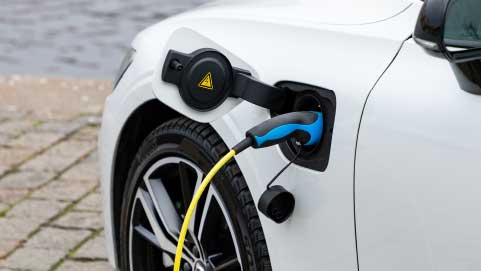The HMRC Advisory Fuel Rates (AFRs) provide vital guidance for businesses and employees using company vehicles for business travel. These government-set rates ensure fair and accurate reimbursement for business mileage and help simplify fuel expense claims for company car users.
The latest government advisory fuel rates came into effect in March 2025 and include reductions for petrol and diesel vehicles, while rates for LPG and electric cars remain unchanged.
Contents
- What are Advisory Fuel Rates?
- Why should your business use AFRs?
- What are the current Advisory Fuel Rates?
- Petrol vehicles
- Diesel vehicles
- LPG vehicles
- Electric vehicles
- Frequently asked questions
What Are Advisory Fuel Rates (AFRs)?
Advisory Fuel Rates are the rates set by HMRC to help employers reimburse employees for business travel in company cars, or for employees to repay fuel used for private travel. The rates aim to reflect current fuel costs across petrol, diesel, LPG, and electric vehicles.
These rates are regularly reviewed and updated by HMRC to ensure they remain aligned with changing fuel prices and vehicle efficiency standards. For employers, AFRs provide a straightforward method of reimbursing mileage expenses without needing to calculate fuel costs manually for every journey.
Why should your business use AFRs?
Using HMRC Advisory Fuel Rates makes it easier for employers to manage mileage reimbursements for employees who use company vehicles. These rates are set by the government and are designed to reflect current fuel prices, so businesses don’t need to spend time calculating fuel costs for every trip.
By following these rates, companies can simplify their paperwork and stay in line with tax rules, reducing the risk of mistakes or problems during audits.
Another key benefit is that employers can reimburse employees without triggering extra tax charges, as long as the payments match or stay below the HMRC rates. If the rates are exceeded, the extra amount becomes taxable, which could create more work for both the employer and the employee.
AFRs also ensure fairness by making sure employees are properly reimbursed for their business travel costs. For employees, this means they don’t have to worry about being out of pocket when using a company car for work purposes.
What are the current Advisory Fuel Rates?
The new rates, valid from 1st June 2025, show reductions for petrol and diesel vehicles, while rates for LPG and electric vehicles remain steady. Hybrid vehicles are treated as petrol or diesel for AFR purposes.
Petrol Vehicles
| Engine Size (cc) | Mean MPG | Fuel Price (Per Litre) | Fuel Price (Per Gallon) | Rate Per Mile | Advisory Fuel Rate |
| Up to 1400cc | 51.0 | 138.7 pence | 630.7 pence | 12.4 pence | 12 pence |
| 1401 to 2000cc | 42.3 | 138.7 pence |
630.7 pence |
14.9 pence |
14 pence |
| Over 2000cc | 27.1 | 138.7 pence |
630.7 pence |
23.3 pence |
22 pence |
Diesel Vehicles
| Engine Size (cc) | Mean MPG | Fuel Price (Per Litre) | Fuel Price (Per Gallon) | Rate Per Mile | Advisory Fuel Rate |
| Up to 1600cc | 56.9 | 146.1 pence | 664.3 pence | 11.7 pence | 11 pence |
| 1601 to 2000cc | 49.3 | 146.1 pence |
664.3 pence |
13.5 pence |
13 pence |
| Over 2000cc | 38.0 | 146.1 pence |
664.3 pence |
17.5 pence |
17 pence |
LPG (Liquefied Petroleum Gas) Vehicles
| Engine Size (cc) | Mean MPG | Fuel Price (Per Litre) | Fuel Price (Per Gallon) | Rate Per Mile | Advisory Fuel Rate |
| Up to 1400cc | 40.8 | 98.3 pence | 446.9 pence | 10.9 pence | 11 pence |
| 1401 to 2000cc | 33.8 | 98.3 pence |
446.9 pence |
13.2 pence |
13 pence |
| Over 2000cc | 21.7 | 98.3 pence |
446.9 pence |
20.6 pence |
21 pence |
Electric Vehicles
For electric vehicles, the advisory electricity rate remains 7 pence per mile as of March 2025, reflecting average charging costs and efficiency rates.
These updated figures ensure accurate reimbursement aligned with the latest HMRC guidance and fuel price trends.
Hybrid cars are treated as either petrol or diesel cars for advisory fuel rates.
Frequently asked questions
Yes, companies can pay more, but any amount above HMRC’s rate is treated as taxable income for the employee and must be reported, with additional National Insurance contributions required from the employer.
HMRC may review mileage claims during audits. Keeping accurate records of journeys, including dates, purposes, and distances, is essential to avoid penalties for incorrect or inflated claims.
While HMRC doesn’t always require fuel receipts for AFR-based claims, it’s good practice to keep them as proof of fuel purchases, especially for audits or company reimbursement policies.
Make the most out of Advisory Fuel Rates
Managing Advisory Fuel Rates (AFRs) doesn’t have to be a challenge. With the right approach, you can ensure compliance while keeping your fleet operations efficient and cost-effective.
At Pendragon Vehicle Management, we offer the expertise to support your business in navigating AFR changes and implementing effective fleet management strategies. Explore our fleet solutions to learn more about how we can help, or contact us today for personalised advice.






